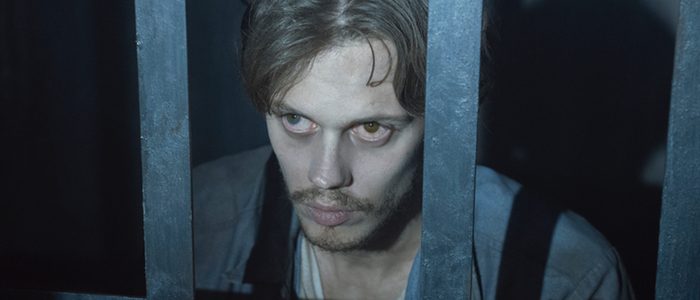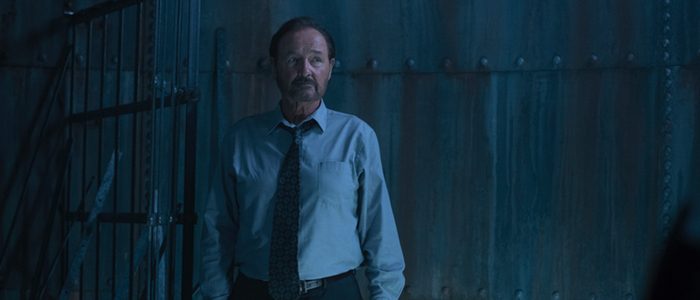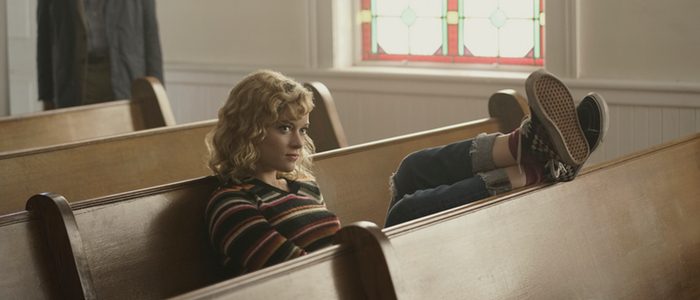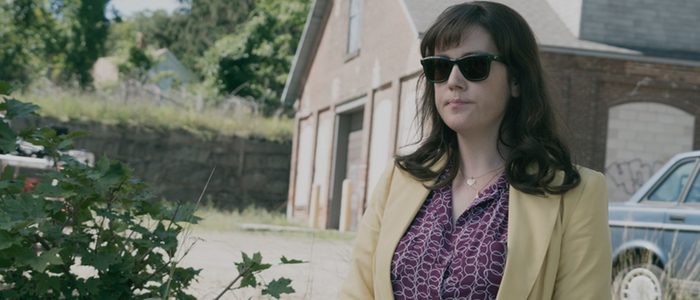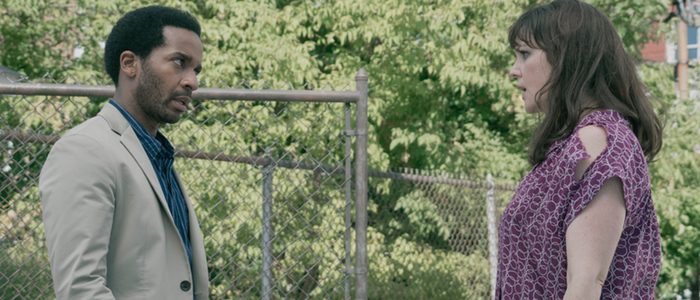'Castle Rock' Review: 'Severance', 'Habeas Corpus', And 'Local Color' Welcome You To Stephen King Country
Welcome to our spoiler-filled Castle Rock reviews, in which we explore Hulu's new Stephen King-inspired series. (If you're looking for a spoiler free review of the show, click here). This week we kick things off with the first three episodes: "Severance", "Habeas Corpus" and "Local Color."
Severance
There's one thing many filmmakers miss when adapting the work of Stephen King: character is key. Too often, people think of King as a brand – a familiar name to slap on a product with hopes that will be enough to give the audience a thrill. But King's work is comprised of more than things that go bump in the night. What really makes King tick is his incredible ability to paint realistic characters with only a few words. In almost every King novel, we know exactly who his characters are the minute he introduces them to us. It's almost like a magic trick – the author uses mannerisms (accents, bad habits, repeated phrases almost like mantras) to establish his characters, to burn them into our brain.
Castle Rock gets this. It understands that in order to create a world within the realm of Stephen King, character has to come first, and horror has to come second. The first episode of the new Hulu series set within the familiar world of Stephen King is devoted almost entirely to establishing character, and while this is commendable, it also backfires slightly. As "Severance" unfolds, it becomes clear that Castle Rock is going to be a slooooowwww burn. It's going to take its time, like it or not. It also becomes clear that this is very much a "Mystery Box" series, just as much in the world of executive producer J.J. Abrams as it is Stephen King. While this may hook audiences, it also rings a little false – King dabbles in mystery, but never to this extent.
"Severance" begins in the midst of a bone-chilling Maine winter. It's 1991, and Castle Rock Sheriff Alan Pangborn wanders the woods, looking for something. Or someone. Soon, he finds what he's looking for: Henry Deaver. The young boy has been missing, and he returns seemingly in the blink of an eye. One minute, Pangborn is looking out over the vast, frozen body of water of Castle Lake. Nothing is there. And then, there's Henry. Standing in the dead center. Even though Henry has been missing for days, he shows no signs of frostbite. Which means he couldn't have been outside for very long. And just how the hell did he materialize from thin air like that?
That's a question for another episode, because we're instantly thrust into the present. Castle Rock is a dying town – abandoned lots, burned down homes. A general sense of death settles over everything. The only booming business in town is Shawshank Prison, and the 'Shank and everyone involved with it is about to get a rude awakening. Because the prison's warden, Dale Lacy, (Terry O'Quinn) has decided to take himself out of the equation in a spectacular fashion. After looping a rope around a tree on top of a cliff overlooking Castle Lake – the same Castle Lake we saw frozen over so many years ago – Lacy ties the other end around his neck. He then gets into his car and floors it. The car sails over the cliff, the rope cinches around Lacy's neck, and off goes his head. (Thus the title, "Severance." )
Lacy's death is just the beginning of the strange goings-on. After a new warden arrives at Shawshank, she discovers that an entire block of the prison –Block F – has been closed off and unused since 1987 – despite the fact that Shawshank has an overcrowding problem and is running out of room for its inmates. The warden orders the abandoned block inspected. Two guards descend into the dark and murky block – a place ravaged by fire many years ago. One of the guards – Zalewski (Noel Fisher) – finds something. Or rather, someone. A young man (It star Bill Skarsgård), filthy, disheveled, and locked away in a cage hidden away in an empty water tank. The Kid, as he's called, doesn't speak much. In fact, there's only one thing he says: a name, Henry Deaver. It's a name Zalewksi instantly recognizes. Indeed, it's name every Castle Rock resident might recognize. Because Henry Deaver has a history in the town. The townspeople think Deaver faked his disappearance all those years ago, and in the process, his adopted father, a pastor, shuffled off this mortal coil. Perhaps at Henry's hand.
And where is Henry Deaver (André Holland) now? He's in Texas, serving as a defense lawyer for death row inmates. And no matter how good his closing arguments may be, he can't seem to convince a jury to spare the life of a woman who killed her abusive husband. Later, as she eats her last meal, the doomed woman, pondering her imminent death, murmurs, "What I keep wondering: all the smells we smell; songs and pictures – do you lose them all? Wherever you go next, does the tape get erased? And if it does, you're not really you anymore, are you?"
"Is that what you're afraid of?" Henry asks, his own past flooding back in flashes of brief, silent scenes.
"That's what I want," the condemned woman replies. It's a particularly haunting moment, and it resonates with Henry. It's clear he has a few things from his past he'd like to erase.
What follows is nightmarish – Henry is the only witness to the woman's execution, and it goes terribly wrong. The lethal injection fails to kill her, and in a fit of rage and panic, Henry attempts to break into the death chamber to stop the executioners from trying again.
He fails. Failure seems to be his lot in life. Hanging around his neck like a millstone.
And then he's called home. Zalewski has managed to track Henry down, and he calls him in Texas to tell him about the Kid. Rather than release the Kid and create a public relations nightmare, the new warden is keeping him locked away and hidden in Shawshank. Zalewski, who seems to be the only employee at Shawshank with any sort of empathy, urges Henry to return to Castle Rock to help.
Henry does not find Castle Rock to be warm and inviting when he returns. "Hello, killer," a stranger on the street calls out to him. Local real estate agent Molly Strand (Melanie Lynskey, who steals the entire show), spots Henry getting off a bus and is instantly panicked. Molly has problems of her own. She buys drugs – Oxycodone we learn in a later episode – from a local high school kid to help with a physical – or mental – issue. She also just happens to have a box of memorabilia in her basement devoted solely to Henry Deaver.
Back at his childhood home, Henry's adoptive mother Ruth (Sissy Spacek) is suffering from Alzheimer's and doesn't even recognize him. Ruth is now living with Pangborn (Scott Glenn), the former sheriff who found Henry all those years ago. Henry is not pleased about this revelation. He's also not pleased to learn that the graveyard where his father was buried has been relocated – the graves dug up and planted somewhere else, due to financial reasons. "My experience, the dead are not particular," says Pangborn.
And what of the Kid? He's cleaned up and located to a much nicer cell than his former cage, but it's clear there's something very, very wrong with him. His dead gaze, his stillness. He's like a corpse that occasionally moves. And one night, while Zalewski watches him on the security monitor, the Kid suddenly moves quite a bit. In fact, he seemingly moves through walls, like a ghost. Or does he? Is Zalewski hallucinating? Is the Kid supernatural? Just what in the hell is going on here? In a flashback sequence, we see Lacy tell the caged Kid to ask for Henry Deaver when he's discovered by the Shawshank staff. Why? Seriously...what is happening here?
As far as first episodes go, "Severance" leaves something to be desired. There's a lot of set-up here, and there's the troubling suspicion that the series might follow the Lost model and never get around to addressing all the mysteries it's setting up. What the show does have going for it is its cast. Holland makes for a charming leading man. He wanders through the show with a perplexed look on his face, occasionally slipping into cockiness. He's the lone black face in a town of white people, and he stands out, and then some. Spacek doesn't have much to do in this first episode, but she makes the most of her "sundowning" character. She also gets a laugh when she politely tells Henry, "I adopted a black son!", completely unaware that said son is standing right before her.
Glenn instantly makes an impression as the gruff, miserable, no bullshit Pangborn. His tense interactions with Holland make for uneasy-yet-enjoyable viewing. Lynskey, like Spacek, doesn't get a whole lot here, but she'll eventually become one of the most essential members of the cast. And then there's Skarsgård. The actor got to go big and broad as Pennywise the Clown in It. Here, his character is quiet and mysterious. It's far more creepier than the work he did as Pennywise – the actor has a unique ability to give you the creeps with just a glance.
Castle Rock doesn't hit its stride right out of the gate. We find ourselves intrigued by the show's mysteries, but not quite engrossed. And despite a wealth of references, it doesn't really feel like a Stephen King story. Not yet at least. But there are better, creepier things to come.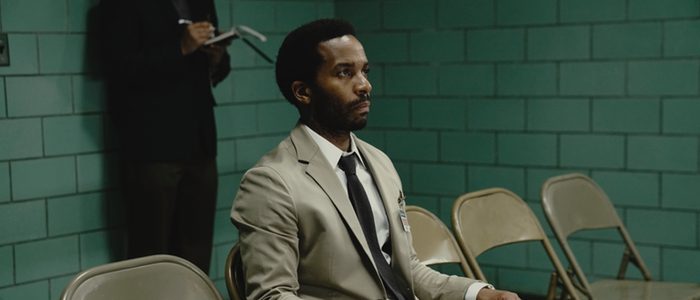
I Understood That Stephen King Reference!
Habeas Corpus
Castle Rock episode 2, "Habeas Corpus", is when the series begins to hit its groove. Primarily because the show takes a step back from setting up so many god damn mysteries and tries to tell a haunting story. A story primarily narrated from beyond the grave by Terry O'Quinn's now-headless Warden Lacy. "It's not luck, it's plan," Lacy's narration begins, "And not God's either. Remember the dog? The Strangler? Sure you do." (The dog is, of course, Cujo. And "the strangler" is a reference to the serial killer from The Dead Zone). These two events are famous – or infamous – in Castle Rock's history, but they're only the tip of the cursed iceberg.
As Lacy says: "Take any house in this town...every inch is stained with someone's sin." We see flashbacks of suicides, and murders. Horrible, horrible things happen in Castle Rock. And why? "People say it wasn't me, it was this place," Lacy's narrates. "And the thing is...they're right."
In rather impressive fashion, Castle Rock's second episode begins answering questions. Episode 1 was so Mystery Box-y that I feared the series was going to turn into a puzzle show, like Westworld. Instead, "Habeas Corpus" delves into some of what was set up previously. We learn just why Lacy locked the Kid away – or at least, his own personal reasoning behind the action. Whether or not it's true remains to be seen. But as far as Lacy is concerned, the Kid is the devil. He's the living personification of all the evil's that plague Castle Rock. And God Himself personally instructed Lacy on how to capture and imprison this devil to save the town.
And Lacy wasn't the only one in on this. Pangborn later runs into the new Shawshank warden at a bar, and begins spouting off about Lacy. "He said he had always thought the devil was just a metaphor," Pangborn says, "but now he knew, the devil was a boy. And he said he caught it – had locked the devil in a box." Before he departs, he gives the Warden a warning: don't let the Kid out.
We also learn why everyone thinks Henry is a murderer. Henry runs into a local, Jackie Torrance (hey, that name sure sounds familiar!), played by Jane Levy. Jackie is fascinated by Henry, treating him like a rock star. Jackie tells Henry he's something of a local boogeyman in town – they think he lured his adopted father out to the woods, then pushed him off a cliff and killed him. Henry corrects her – his father died at home, not in the woods. "Kids used to dress up like you for halloween," Jackie says. "But then it became a whole thing...with blackface..." It's a funny moment, but it once again underlines how much of an outsider Henry is in this very white Maine town. In an earlier scene, Henry pays a visit to Warden Lacy's blind wife (Frances Conroy), who, when she realizes who Henry is, asks, "Are you black?" "Last time I checked," Henry replies, before she throws him out of her house. Right before he goes, though, he notices a padlock on the basement door.
Levy's Jackie Torrance is a breath of fresh air here. All the other actors are playing their parts very seriously, with a truly dour note. Levy's Jackie, however, is almost giddy. And she's giddy over truly ghoulish things, which makes her all the more interesting. Jackie's name is, of course, very similar to that of Jack Torrance from The Shining. But Jackie isn't the one in town with "shining" abilities.
Instead, that gift – or curse – belongs to Molly Strand. As Molly meets with her sister (Allison Tolman), she delves into her drug usage. As Molly puts it, she only takes a small amount of drugs to "muffle other people's noise." She can, essentially, hear what's going on in other people's heads. And it's very, very loud. "Habeas Corpus" tells us even more about Molly. When she was younger, she was Henry's next door neighbor, living in the house across from his. She would spy on him through her bedroom window, and even "stalk" him, according to her sister. We see young Molly writing Henry's name over and over and over again in a notebook.
Henry, meanwhile, heads to Shawshank to try to find info on the mysterious Kid, but the new warden stonewalls him, and pretends she has no idea what he's talking about. In the meantime, she has the Kid moved into a cell with a violent skinhead. The hope is for the skinhead to kill the Kid, and make the problem go away. But it backfires – when morning comes, it's the skinhead who is dead. Before his demise, we saw him begin to threaten the Kid. "You don't want to touch me," the Kid whispers, and apparently this was a warning the skinhead should've listened to. Because when they perform an autopsy on his corpse, they find his body riddled with cancer.
Unable to find the Kid through official channels, Henry resorts to sneaking into Shawshank with a church choir, and the episode concludes with an eerie sequence in which Henry wanders through the Shawshank grounds as Dexter Britain's haunting "Imagining The End" plays. Zalewski, the guard who called Henry in the first place, finds a way to sneak the Kid outside so that he can have a chance encounter with Henry. It doesn't go according to plan – Henry separated from the Kid by several fences, and shouts that he can only be the Kid's lawyer if the Kid asks. But the Kid doesn't ask. He simply stands there, squinting in the sunlight. And that's when Warden Lacy's narration kicks back in. "Never again let him see the light of day," he says. "That's what God told me."
Oops.
The final reveal is that the Warden's narration is coming from a letter he wrote before his death. A letter to Alan Pangborn, in which he calls Pangborn Castle Rock's true protector. From the look on Pangborn's face, he doesn't seem particularly thrilled with this classification.
I Understood That Stephen King Reference!
Local Color
Of the first three Castle Rock episodes, "Local Color" is the best. Primarily because it lets Melanie Lynskey take the wheel. Lynskey is an actress who brings an almost disarming humanity to any part she plays, and her Molly Strand is a funny, tragic, relatable character. In fact, she might be the most interesting character on the show.
And boy oh boy does she have a dark secret. As "Local Color" begins, we see a young Molly stalk out of her house, trudging barefoot through the snow. Henry Deaver is still missing, but his father the pastor has been found – at the bottom of a cliff, badly injured. The man now lays in a bed hooked up to a ventilator, his head wrapped in bandages.
Finding a key hidden under a rock, Molly enters the Deaver house, tip-toes upstairs, and proceeds to kill the injured pastor by unhooking his breathing tube. There's no malice in her actions. She's not gleefully committing murder like an evil little kid in a standard horror movie. Instead, there's a curious detachment as she watches the man die.
This gives way to the first genuinely creepy moment on Castle Rock. A dream sequence in which Molly wanders through a decrepit, snow-filled church. She wanders into what appears to be a funeral, and finds the pews to be filled with people with their heads wrapped in bandages – just like Henry's father was. And Henry's father is there as well, standing at the pulpit, condemning Molly for murdering him.
Why did Molly kill Henry's father? We can't know for sure yet, but it's clear through flashbacks that Henry's relationship with Pastor Deaver was not idyllic. At one point, young Molly catches young Henry setting fire to a VHS tape. "Fuck you, dad," Henry mutters as the tape burns. What was on the tape? I'm speculating wildly here, but if I had to guess, I'd say there was some sort of abuse going on between the pastor and Henry. And Molly, with her crush on Henry, took it upon herself to help Henry by killing the pastor off. We also see that Molly has a kind of psychic bond with Henry – at one point, he cuts his finger, and Molly, across the street, feels the same stab of pain in her own finger. If the pastor was abusing Henry, and Molly indeed has this bond with Henry, that means she was psychically experiencing the abuse as well. And perhaps that would go a long way to explaining why she decided to bump the pastor off.
If young Molly was hoping to find some sort of peace by killing off Henry's father, she was mistaken. Adult Molly is a mess. Her Shining-like abilities are on full display here – we hear the barrage of other people's thoughts barreling through her mind like a runaway train. And yet despite all this, she's trying to go about a normal, stable in life. In fact, she's in the midst of a project to revitalize Castle Rock. A realtor by trade, Molly has devised a plan to open a mall in Castle Rock with the hopes of stimulating the economy. She's all set to go on the cable access show Local Color, and then Henry Deaver walks in on her. Henry's appearance sends Molly into a tailspin, and she rushes out to get some pills from her teenage dealer. But the dealer is all out, and instead sends her to the spookiest motor park in the world to find drugs. There, she encounters a bizarre mock trail proceeded over by children wearing homemade masks. During this, the children accuse her of murder – an accusation that clearly unnerves her. These kids are just playing a game...or are they? Do they somehow know what Molly has done? Or is this all in her head?
It's moot, because soon the police arrive, and Molly ends up in jail for trying to score drugs. As luck, or fate, would have it, Henry just happens to learn of Molly's incarceration and uses his lawyer-skills to get her out. He also rushes her off to her appearance on Local Color...which goes about as well as you can expect. After sputtering and stammering, Molly puts on some sunglasses like a drunk with a hangover from hell, and proceeds to tell the residents of Castle Rock to "wake the fuck up." She also reveals that within the walls of Shawshank, a young man – the Kid – is being held against his will. Henry is stunned – he's told her none of this, and yet she somehow knows. And now it's out in the open, beamed out on the airwaves to the TV viewers of Castle Rock.
Watching Lynskey work in this episode is an absolute delight. She goes from amusing to heartbreaking in the blink of an eye, and none of it ever rings false. Her flustered attitude around Henry is both charming and sad. She asks Henry if he's ever had a song stuck in his head, and then says, "When we were younger...you were that song. And I'm not saying you're a bad song. You're obviously a very handsome song, and you dress better than the other songs in this town..." This is marginally clever dialogue, but Lynskey sells it perfectly, the modulations and nervous quiver in her voice as she trails of at the end doing most of the heavy lifting. (Lynskey's funniest moment comes when she's rehearsing what to say on Local Color, and mock-cheerfully describes herself as a "Fifth generation Maine-iac.")
With the Kid's existence out in the open, Shawshank's warden has no choice but to finally let Henry see the mysterious inmate. First, she attempts to offer a settlement for a large chunk of change, provided the Kid sign a NDA and not threaten to sue Shawshank for wrongful imprisonment. Henry is quick to point out that this isn't wrongful imprisonment – it's kidnapping.
Henry finally comes face to face with the Kid, and learns just how creepy he is. The Kid doesn't say much, but what he does say is cryptic and eerie."Has it begun?" he asks Henry. "Do you hear it now?" It's not clear just what he's talking about, and normally this deliberate obtuseness would drive me up a wall. But Skarsgård's mannered, monotone delivery goes a long way.
"Local Color" closes with one last shock. Molly enters her childhood home to find it wrecked. And upstairs, she encounters what appears to be the ghost of Henry's father, his face swathed in bandages, spots of blood marking his eyes and mouth. Molly flees, only to turn and see the apparition has vanished. If it was even there to begin with. Cue the spooky music.
I Understood That Stephen King Reference!

